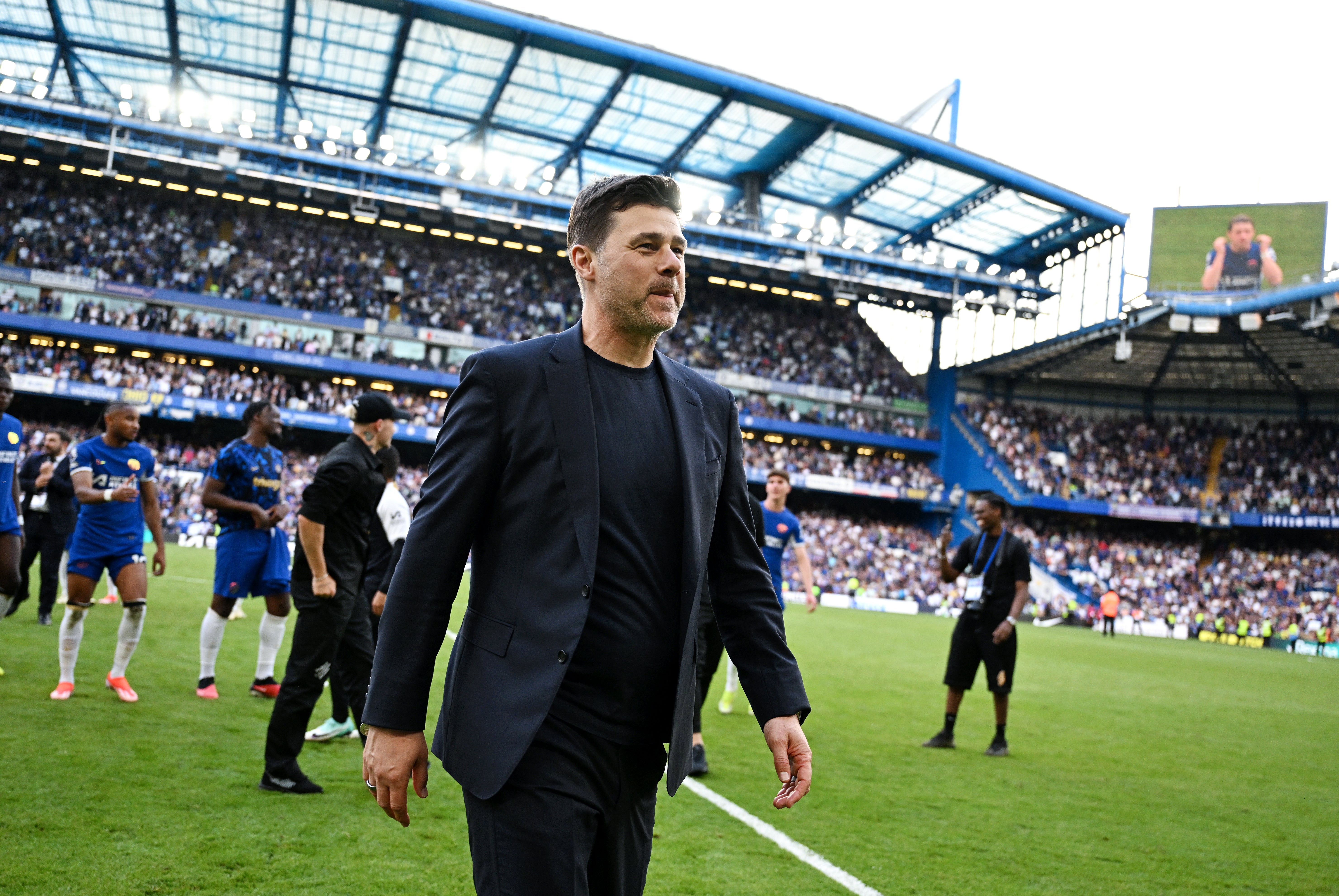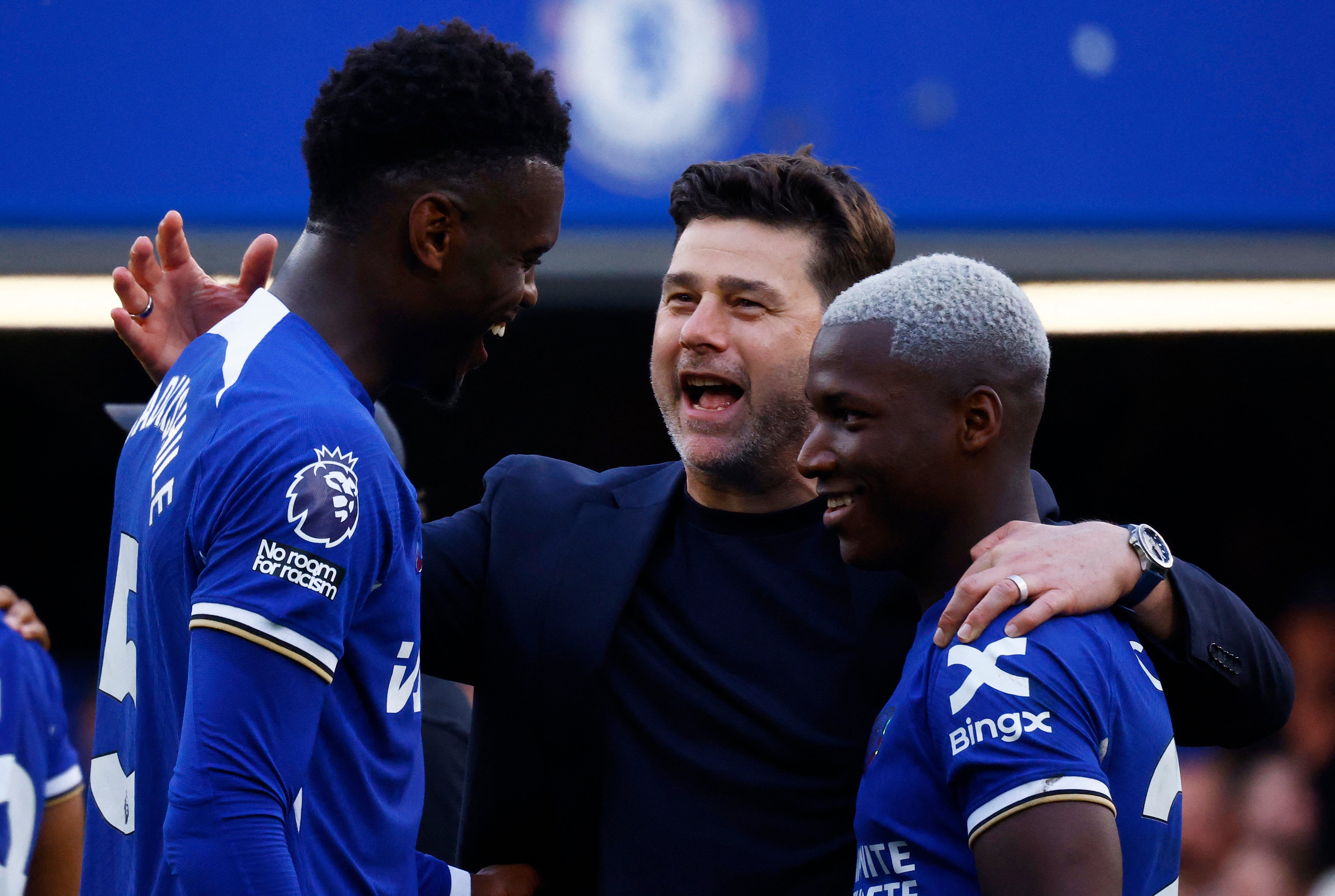Mauricio Pochettino should stay – but Chelsea must solve these problems for real progress
The Argentine coach has inspired a positive end to the season to produce progress from a chaotic situation but speculation remains over his future at Stamford Bridge

Your support helps us to tell the story
From reproductive rights to climate change to Big Tech, The Independent is on the ground when the story is developing. Whether it's investigating the financials of Elon Musk's pro-Trump PAC or producing our latest documentary, 'The A Word', which shines a light on the American women fighting for reproductive rights, we know how important it is to parse out the facts from the messaging.
At such a critical moment in US history, we need reporters on the ground. Your donation allows us to keep sending journalists to speak to both sides of the story.
The Independent is trusted by Americans across the entire political spectrum. And unlike many other quality news outlets, we choose not to lock Americans out of our reporting and analysis with paywalls. We believe quality journalism should be available to everyone, paid for by those who can afford it.
Your support makes all the difference.The biggest risers in the charts were the club who finished six places higher than last season, took 19 more points and scored over twice as many goals. That success story of the final Premier League table is, er, Chelsea. Yes, that Chelsea, the byword for excess, the club who spent £1bn to regress, the petri dish for Todd Boehly’s weird and wacky ideas.
Or, to put it another way, Chelsea still finished three places lower than they had two years earlier, taking 11 points fewer in 2023-24 than in 2021-22. Mauricio Pochettino has argued that the new Chelsea should not be judged by the standards of the old, the serial trophy winners packed with senior players. Perhaps it flatters him to compare this season with the artificial low of the 2022-23 car crash, the Potter-Lampard year of four managers, a mere 44 points, just 38 goals and the historic failure of 12th place.
And yet Pochettino – a manager in limbo with his two-year contract looking absurdly short in comparison with those of some of Chelsea’s most undistinguished players and waiting for a call from the owners to discover his own future – can point to proof of progress. It is a level of improvement that, at a club with a revolving door in the last couple of years, ought to bring some stability: Pochettino should stay. Sixth place, a cup final and a semi-final offer endorsements of his work in a campaign that has still featured some embarrassments.
There is an enduring bizarreness to this £1bn project, plenty of problems caused by confused thinking and wild recruitment. Every setback can feel chastening. The probability is that this season, like last, Chelsea’s owners expected Champions League qualification. This season, with injuries of their own piling up, among the eight contenders, they only finished ahead of another injury-ravaged team in Newcastle and the utterly dysfunctional, while also injury-ravaged Manchester United.
But whereas before Christmas, Chelsea had a bottom-half return (ignoring Everton’s deduction), since then they have the fourth-most points, averaging over two per match and with 48 goals in 20 games. If part of that can traced to the phenomenon of Cole Palmer, that return to prolific scoring came when the finest forward signed, Christopher Nkunku, was invariably injured, and Chelsea’s extraordinary outlay still did not produce a genuine No 9.
The second half of the season still contained the home hammering by Wolves, which Pochettino admitted had him fearing the sack, the Carabao Cup final defeat to Liverpool’s kids, with the loss of nerve when an opportunity presented itself in added time, and Premier League hammerings by Liverpool and Arsenal. Chelsea have set an unwanted club record by conceding 63 times in a Premier League season; the quest for a defensive formula will be pertinent next season, along with the question of whether their two midfielders, Enzo Fernandez and Moises Caicedo, acquired for over £100m apiece, are compatible or effective at shielding the back four.

Yet an injection of excitement has been a start. So, too, has been the development of some players. Pochettino has shown he can play attacking football and nurture the emerging. Nicolas Jackson has had misses aplenty but a tally of 17 (non-penalty, of course) goals from a raw recruit reflects well on the Argentinian. Malo Gusto is shaping up as the second-best signing of the new regime. In the last few weeks, Pochettino has contrived to get the wildly overpriced Marc Cucurella playing well. He has seemed to be fighting a rearguard action to keep Conor Gallagher but the stand-in captain has arguably been, after Palmer, Chelsea’s outstanding individual this season. Pochettino has brought some brilliant, if at times anarchic, games; it has been an antidote to the sterility of Graham Potter’s tenure.
None of which automatically indicates that there is a smooth line of progress should Pochettino remain. Yet that is a reflection of the chaos that he did not create. Chelsea still have the mystery of Mykhailo Mudryk and why anyone paid £88m for him. They have a bunch of punts on potential – Andrey Santos, Cesare Casedei, Lesley Ugochukwu, Angelo Gabriel, Gabriel Slonina – who have offered too little evidence they will either become high-class first-team players or produce a profit. They have the question if anyone can make Caicedo and Fernandez the sum of their parts, rather than two mismatched midfielders who seem better apart. They have the silly decision – not Pochettino’s – to make Reece James captain; a year of injuries and red cards has followed. They have the habit of buying injury-prone footballers who then get injured. They still don’t have an elite No 9 or goalkeeper.

No one could make complete sense of this mess. With or without Pochettino, Chelsea are ploughing on further down their path: they are close to spending over £50m on the Brazilian prodigy Estevao Willian, a winger to join a squad overflowing with wingers. There is presumably the need to sell – players, hotels, anything else they can get their hands on – to pass PSR.
After qualifying for Europe, they have the issue of Uefa’s more stringent FFP rules, meaning they can only amortise signings over a maximum of five years. There will be the search for more loopholes to try and bypass financial legislation. There is the likelihood Chelsea’s owners banked on Champions League revenue next season as well as this and will get it in neither. But the Boehly years show that changing manager is not guaranteed to produce an immediate uplift; Bayern Munich’s increasingly excruciating hunt shows it is hard for even clubs in more advantageous positions than Chelsea to make a high-grade appointment.
And if Pochettino’s first year at Stamford Bridge has been wildly imperfect, Chelsea have far greater problems than him, no obvious better solution in the dugout and the risk they could be plunged downwards by further change. He should stay.



Join our commenting forum
Join thought-provoking conversations, follow other Independent readers and see their replies
Comments